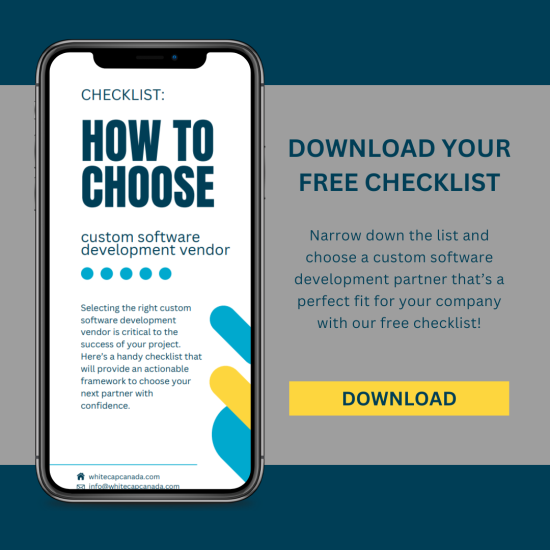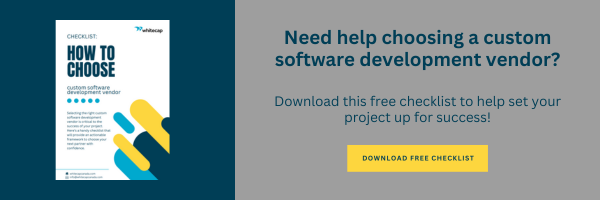|
Getting your Trinity Audio player ready...
|
There’s no shortage of custom software development vendors out there—each vying for your business. So, with all the companies and claims, how do you know which one is the right one for you? Whether you’re developing a new application or upgrading an existing system, selecting the right partner is critical to the success of your project. You’ve got to get it right!
That’s why we’ve put together this actionable framework that will help you narrow down the list and choose a custom software development partner that’s a perfect fit for your company. Let’s dive in!
10 Key Criteria for Evaluating Custom Software Developers
Here are the 10 key criteria to empower you to make a confident choice. (And, don’t forget to download the handy PDF checklist at the end for quick reference.)
1. Define Your Requirements
The first step involves a lot of “project prework.” From clearly defining your project goals and requirements to establishing a budget, these steps are critical to ensuring everyone internally is on board and aligned. This will also help clarify what you need from a prospective software development vendor.
Start by going through the process of building your business case. You’ll need to identify your needs, engage your stakeholders and nail down your requirements. Once that is done, ask yourself:
- What does success look like?
- What costs are involved?
- What’s the risk and what can we do about it?
- How will we put our plan into action?
- Can we “futureproof” our investment?
Pro Tip: Use our step-by-step guide for building the business case and then get tips for budgeting as well as pointers on best practices.
2. Research and Shortlist Companies
Now that you have defined your requirements and set your budget, you can start to look around for custom software development companies to partner with. Yes, there are a ton of them out there, though often with different areas of expertise. To narrow down your choice, you can begin by looking for companies with a strong track record in your industry or technology stack. This will give you a list of reputable custom software developers.
To make sure you have a good fit with your prospective vendor, define what’s important. This may include:
- A fully local team (no offshoring) or headquartered close enough for in-person meetings or in same time zone for virtual meetings
- Many years in business with a proven track record
- Expertise in your sector
- A clearly defined process
Pro Tip: Use resources such as Clutch, GoodFirms, LinkedIn, Google reviews and referrals from colleagues to evaluate prospective custom software vendors. The combination of these resources will give you a better, more rounded picture of the companies on your shortlist.
3. Evaluate Portfolios/Case Studies
You will want to know that the development company you hire can take on your project successfully. Review the portfolios and/or case studies of shortlisted companies, and assess them for three main factors:
- Their experience
- The quality of work
- The relevance to your project
Pro Tip: Any vendor worth your time will include case studies and examples of their work in a proposal for your consideration. Check out how they addressed the client’s challenges as well as how the solution delivers measurable results.
4. Check References and Reviews
When reviewing reference and reviews look beyond the “surface praise.” Instead make sure the testimonials speak to particular strengths, such as the ability to meet project deadlines, how the company solved a problem and ease of communication.
Online reviews and website testimonials are great, but they may not tell the whole story. Be sure to contact past clients to gather feedback on their experiences. This will help you to gauge the company’s ability to communicate, solve the hiccups that happen during every project and deliver on their promise. At Whitecap Canada, we frequently put prospective clients in touch with past clients for whom we’ve done similar work.
Pro Tip: Be sure to ask how the development company communicated throughout the process, if there were any issues that arose and how it was resolved. Do not under any circumstances skip this step!
5. Assess Technical Expertise
Another very important consideration is the custom software vendor’s tech stack. The technology chosen for developing custom software will have a direct impact on the project’s longevity, scalability, and overall success. You need to ensure that the company has the necessary technical skills and expertise to take on your project. As a Microsoft Partner, most of our custom development work involves Microsoft tools and technologies. But we also make extensive use of many other leading frameworks and open-source tools.
In addition to checking certifications and conducting technical interviews, you’ll want to see that the prospective company has a robust knowledge and the depth of expertise in relevant technologies.
Pro Tip: Be open to change if it is based on a better outcome. There have been times when clients have come to us with specific technologies, frameworks or platforms in mind for their projects. Yet, after a detailed discovery we have recommended a different approach. This happens for a variety of reasons including a superior end result, software durability and scalability, and costs.
6. Conduct Interviews and Meetings
People can make or break a project. It’s essential to meet with the custom software company’s team members, including project managers, developers, and designers. The interviews will give you a clearer idea of what it’s like to work with the vendor on a regular basis. It will also help you to assess their capabilities, commitment, and fit with your team. These conversations are pivotal in deciding the right fit for your project, not just in technical capabilities but in how the company can collaborate with you to create a shared vision.
Pro Tip: In these one-to-one conversations, be sure to ask how they tackle challenges or changes to scope. Ask for specific examples of their problem-solving abilities with other clients.
7. Evaluate Communication and Collaboration
As in any relationship, good communication is key. From the first interaction right up to getting the proposal, assess the prospective software development company’s responsiveness and clarity of communication.
There are three things to consider as you go through your shortlist:
- Communication: Will there be regularly scheduled meetings with team members and other stakeholders to discuss progress, address any concerns, and make decisions?
- Project management tools and methodologies: What collaboration tools, such as project management software, will they use to facilitate communication and teamwork?
- Cultural fit: When you work with a remote team there’s the potential for challenges due to cultural nuances. Do the values, work ethics, and communication styles of your software development firm match those of your organization? A solid cultural fit engenders a positive working relationship, with seamless collaboration and understanding.
Pro Tip: Find out who your project manager and day-to-day contact will be and make sure you can work with them. This is the person you’ll be interacting with the most once your project kicks off. If you have a hard time communicating with them, it’s a red flag.
8. Review Proposals and Quotes
By now, your list will be scaled down to the best of the best, and it’s time to compare apples to apples. Request detailed proposals from all your shortlisted companies. With custom software development, the old adage “you get what you pay for” rings true. Look beyond just the price. Gather the quotes together to compare:
- Project approach and methodology
- Timeline and milestones
- Cost estimates and payment terms
- How changes in scope are managed
We always ask to present our proposals as opposed to just emailing them to prospective clients. Don’t skip this important step. It’s another opportunity for you to assess the vendor’s expertise, understanding of your project requirements and cultural fit. And it allows you to address any questions or objections on the spot.
Pro Tip: Even the best planned projects often go a bit over budget because requirements may change, or there may be unexpected issues as development progresses. Building in time and budget contingency is key.
9. Legal and Contractual Considerations
At this point, there may be a standout developer that you want to work with, and you want to proceed with a contract. Before signing on the dotted line, ensure that it is both clear and fair, and pay particular attention to the small print, specifically:
- Intellectual property rights: Who owns the IP? You should always protect your IP in case you ever need to switch vendors. For example, all the custom software we develop is the IP of our clients and an asset to their business.
- Confidentiality agreements: Protecting confidential information and trade secrets is a key issue of every project. Usually, the confidentiality agreements last for the period of the contract relevance, but it is also important to maintain them even after the contract completion.
- Terms for termination and dispute resolution: No one likes to think about a project or a business relationship not working out. Hopefully it all is rosy. However, if things do turn sour, the terms must be reasonable.
Pro Tip: Seek legal advice if necessary to ensure you fully understand the contract terms and protect your interests.
10. Support Options
Getting your project up and running is only one part of the equation. Understand what your software support options are post-launch. Like anything, software requires maintenance, upgrades, bug fixes and enhancements. Your vendor should be able to help you plan for these ongoing and future support needs, whatever level of support that may be. For example, you may need 24/7/365 support for mission critical software, and only timely, ad hoc support for smaller apps.
Pro Tip: Software needs evolve over time, so choose a custom software development partner that can accommodate future enhancements or additional features. A reliable and professional company will offer ongoing maintenance and support to ensure that your project is a success when it launches as well as for years to come.
Download your free evaluation checklist for hiring a custom software development company here.
Are You Looking for Custom Software?
If you’ve got a software development project you’re considering, you need a partner who can help. We’ve got a proven approach and the expertise leading businesses depend on to develop custom software applications that become core to their companies. Let’s chat.

